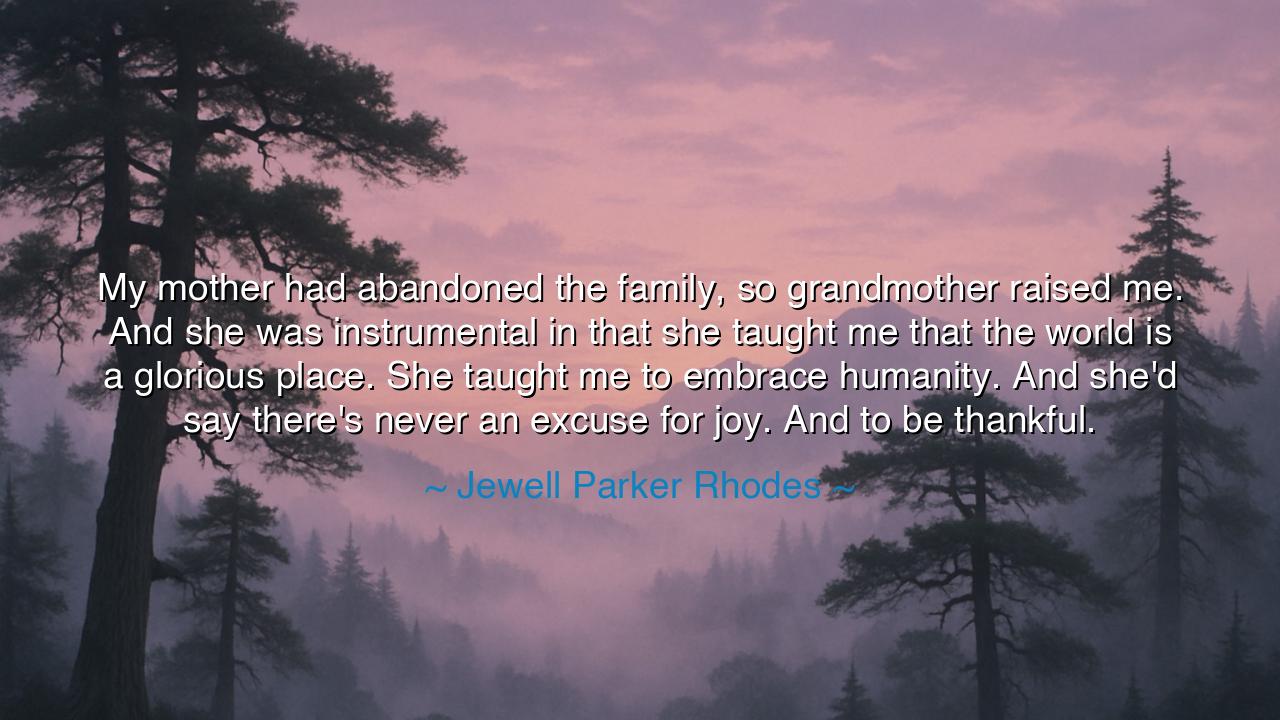
My mother had abandoned the family, so grandmother raised me.
My mother had abandoned the family, so grandmother raised me. And she was instrumental in that she taught me that the world is a glorious place. She taught me to embrace humanity. And she'd say there's never an excuse for joy. And to be thankful.






In the words of Jewell Parker Rhodes, we encounter a testimony that pierces through sorrow and rises toward light: “My mother had abandoned the family, so grandmother raised me. And she was instrumental in that she taught me that the world is a glorious place. She taught me to embrace humanity. And she'd say there's never an excuse for joy. And to be thankful.” These are not words born of ease, but of trial; not the reflection of a life unmarked by pain, but of a spirit that chose to gather wisdom even in the shadow of loss. In her memory of her grandmother, Rhodes reveals to us the timeless inheritance of resilience, gratitude, and joy.
At the heart of her declaration lies the figure of the grandmother, who steps forth when abandonment and loss might have consumed a child’s soul. Instead of letting bitterness take root, this matriarch sowed seeds of light. She taught Rhodes to see the world not as broken, but as glorious, not as hostile, but as brimming with humanity worth embracing. Such wisdom is heroic, for it does not deny the harshness of life, but insists upon meeting it with joy. To be thankful, her grandmother taught, is not a luxury but a discipline, a posture of the soul that transforms sorrow into strength.
History offers us many mirrors of this truth. Consider Nelson Mandela, who spent 27 years in prison, deprived of freedom, family, and the simple pleasures of life. Yet from his confinement he emerged not poisoned with hatred, but radiant with forgiveness and hope. He declared the world still glorious, humanity still worthy of love. Like Rhodes’ grandmother, Mandela understood that joy is not found by circumstance alone—it is chosen, even in darkness. This is the wisdom of those who refuse to let suffering define them.
When Rhodes recalls that her grandmother said there is “never an excuse for joy,” we must pause and understand. It is not that sorrow is denied, nor that hardship should be ignored, but that joy is never something to be postponed or excused away. Too often, people wait for perfect conditions before allowing themselves to be joyful. But her grandmother’s teaching reminds us that joy is a flame that can burn even in the storm. To carry joy is to defy despair, to claim victory over abandonment, loss, and struggle.
There is also a profound humility in the call to be thankful. Gratitude disarms bitterness. Gratitude turns the smallest blessing—a meal, a smile, a moment of peace—into wealth for the soul. Rhodes’ grandmother, who had every reason to focus on hardship, chose instead to magnify life’s treasures, teaching her granddaughter to walk in thanksgiving rather than resentment. This teaching is as ancient as it is urgent, for even the Stoics of old declared that the wise man sees fortune not in what he lacks, but in what he can give thanks for.
From this wisdom flows a lesson for us all: when life wounds us, we have two paths. One is to clutch bitterness, to curse the world, and to wither within. The other is to embrace the world’s glory, to open our arms to humanity, and to walk in joy and gratitude. The first path leads to ruin; the second, to freedom. The choice, though difficult, remains always ours.
Practical steps are clear. Begin each day with a word of thankfulness—for breath, for life, for one small gift at hand. Seek joy not in perfection, but in simple moments: in laughter shared, in nature’s beauty, in the dignity of kindness. And when hardship comes, remember Rhodes’ grandmother’s words: there is never an excuse strong enough to rob you of joy. Joy is not absence of pain, but the triumph of the spirit over it.
Thus, let the wisdom of Jewell Parker Rhodes and her grandmother live on in us. For the world is indeed glorious, not because it spares us sorrow, but because in spite of sorrow we can still rise, still love, still give thanks. Carry this flame into your life, and you too will become a beacon—teaching future generations, as she was taught, that no wound can silence the soul that chooses thankfulness and embraces joy.






AAdministratorAdministrator
Welcome, honored guests. Please leave a comment, we will respond soon